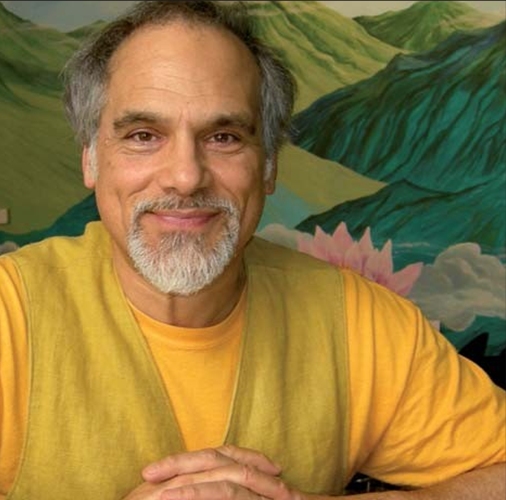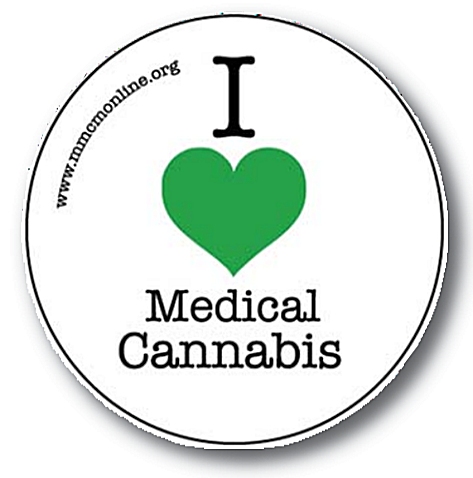
At long last, Connecticut has a Medical Cannabis Program
By Mary Lou Smart © 2012 www.medicalcannabisart.com
Across the United States, medical cannabis is becoming an accepted alternative therapy. Critical to today’s fight for compassionate care are the patients. Risking arrest, defamation of
character, and financial ruin they step forward and testi- fy to legislators about their conditions and the plant that helps them. Treating Yourself readers might know about Mark Mathew Braunstein. This modern day Thoreau lives in the woods and abhors the distractions of TV, cell phones and the like. He has written for Treating Yourself. He is a vegan who grows and writes about growing sprouts and microgreens, and does not eat dairy prod- ucts, or foods containing white flour, or refined sugar. His website, www.markbraunstein.org, is filled with vegan- inspired artwork, his philosophy, and his photographs of nudes in nature.
Braunstein, 62, is a paraplegic as a result of a 1990 div- ing accident that injured his spinal cord and left him par- tially paralyzed from the waist down. Prior to his acci- dent, he was a mountain hiker, swimmer and marathon runner. He smoked marijuana recreationally, maybe once a week, on the weekends. Following the accident, he also smoked occasionally while at a rehabilitation center. There, in a peaceful wooded setting, he sat and smoked while contemplating the circumstances of his new life as a paraplegic. When he returned home and went back to work— he is the art librarian and curator at Connecticut College — he stopped smoking. After a few days without weed, he noticed something unusual. His legs, only par- tially paralyzed, experienced painful spasms that made it almost impossible to do already compromised activities like walking and driving. A few weeks later, when he smoked a joint recreationally, he noticed something else. After smoking marijuana, the spasms disappeared. He did not need much, maybe a few tokes once daily, but the spasms went away with the smoke.
Persistent in his support
for a medical cannabis program in
Connecticut, he first testified before a legislative com- mittee in 1997. His family and friends were
concerned that he was admitting to
growing and smoking something that was illegal,
and worried that he would be arrested.
Legislators also noticed.
Mark Mathew Braunstein:
Testified in Favor of Medical Cannabis since 1997
“For me, the most interesting part of his testimony was that he’d say it (cannabis) was there, he grows it all of the time, and uses it for medicinal purposes, and if they’d like to come and search his house, they would be more than welcome,” said Mike Lawlor, a legislator at the time who was co-chair of the Judiciary Committee that held many of the hearings. “The police never took him up on that. To me, that underscored that as a practical matter, police have no interest in prosecuting these cases. Keeping that in mind helped people to understand why it is important to clarify the law. The law should conform to reality.”
The timeline of the program’s back and forth progression through the legislature reads like a ping pong tourna- ment. One year the Senate would approve the bill but it would die in the House of Representatives. One year the House would approve it but the Senate would not. One year the bill would die in both the House and the Senate. One year both approved but the Governor vetoed. Year after year, Braunstein testified. In 2011, while testifying before the Judiciary Committee, he made the observation that it was obvious that he was not the only entity suffer- ing from paralysis.
Medical cannabis had considerable support in Connecticut, reflected in a Gallup poll showing more than 75 percent in favor. After again failing in 2003, it was noted that legislators had questioned the lack of sup- port from physicians. Then Rep. James W. Abrams, now a Superior Court Judge, sponsored the 2003 and 2004 bills. In 2004, his office contacted every physician in the state, as well as nurses, chiropractors and dentists, to see if they would endorse the bill. When the bill was intro- duced again in 2004, more than 300 physicians endorsed it. A medical cannabis program later was co-sponsored by Rep. Penny Bacchiochi, a conservative Republican who had initially learned about the unprotected status of the medicine while trying to procure some for her dying husband. Since her own harrowing indoctrination into marijuana’s Prohibition, she had spoken to countless patients, and testified several times about the importance of protecting them.
In 2012, a funny thing happened. The usual lobbyists pushing for reform were not notified. Fresh faces had entered the picture. Eileen Konieczny, an oncology nurse who works in New York and Connecticut, testified in favor of the program in 2011. That year, after the bill died in both the House and Senate, she decided to get more involved. She arranged a luncheon in Hartford. Several government types including Lawlor, Rep. Gerald Fox and legislative liaison James Desantos; Erik Williams, director, Connecticut NORML, who had also testified in 2011; and Dr. Alan Shackelford, a Colorado physician who makes cannabis recommendations, dis- cussed sticking points that had stalled previous bills and features that made bills more palatable to legislators in other states.
“In my line of work — I do death and dying — there is not one day that I work that I don’t meet somebody that could benefit from the use of medical cannabis,” Konieczny said. “Not one. The laws that are being writ- ten now really do address standards as well as the med- ical aspects of cannabis therapy, and that is necessary for legislators to go along.”
A bill was presented in the House and Senate. Both approved An Act Concerning the Palliative Use of Marijuana. HB 5389 was signed into law on May 31 by Gov. Dannel Malloy.
Connecticut’s medical marijuana law, Public Act 12-55, is strict. It will allow state-registered patients or their care- givers to obtain marijuana from dispensaries. Only phar- macists will be allowed to file applications to run the state-licensed dispensaries. Dispensaries may obtain mar- ijuana from licensed producers, growers, who will pay a non-refundable application fee of at least $25,000. The hefty application fee, which must be renewed every five years, is a barrier to entry by the types of small business- es that dot the landscape in western states like California and Colorado. There will be no fewer than three and no more than 10 growers in the state.
Patients — who must be 18 or older
— will be able to obtain a one-month supply, with amounts to be deter-
mined by the Commissioner of Consumer Protection after consultation with the Board of Physicians. The bulk of the bill will go into effect on October 1, 2012, includ- ing a provision to allow patients to obtain a temporary registration to possess marijuana while the department implements the remainder of the act.
Connecticut’s program is just getting off the ground. Fresh updates, such as procedures for doctors to follow to qualify, began appearing on the program’s website, which is listed under the Department of Consumer Protection, in August. http://ct.gov/dcp/medicalmarijuana
There is no home-grow provision written into the law, which could be a considerable hardship to many who grow their own. Even so, many who had a role in the bill’s passage maintain that while home growing is not mentioned, individuals are allowed to grow their own, as long as they have no more than the to-be-announced one- month supply on hand at any time.
Until two years ago when Gov. Malloy appointed him to his administration as under-secretary for Criminal Justice Policy and Planning Office of Policy and Management, Lawlor was co-chair of the Judiciary Committee during the bill’s long journey. He has a thorough understanding of the law that guides the program. “You can grow your own,” he said. “You are allowed to have up to a one month’s supply.”
While legislators and policy makers insist that the home- grow provision is implicit, others are not so sure.
“By the time we saw the bill, which the Governor’s office rolled out, it had pretty much been written,” said Lorenzo Jones, executive director, A Better Way Foundation, which had advocated for reform for years. “We had attempted to work with our lobbyist to get the second half of the bill amended to include the self grow, expand the number of producers, and do a number of dif- ferent things, but those amendments were not allowed to be called in the legislature.”
Konieczny admits that at face value a Connecticut med- ical cannabis recommendation and card will not give patients much at first. Dispensaries and grow operations will not be in place for over a year, and the program that was passed does not appear to address factors key to using cannabis as medicine.
“Right now it is basically
a get-out-of-jail-free card,” she
said. “I’ve been told by multiple
people that are in the government
that the home-grow feature is
implied only. I honestly do
not think that they will go after real patients. This is a Catch 22 for people like me. Do I encourage
patients to grow their own?”
Having a medical cannabis program without provision for edibles was a situation anticipated by Williams in his testimony when he said that “smoking medicine is neither the preferred nor the best method of delivery for most patients. Making tinctures, edibles and topical ointments with clear dosage and standardization available will help make this program successful.”
Nevertheless, the bill has only vague mention of products created with cannabis.
“The legislation does not mention medibles or edibles at all, which is something that surprised me, but because I do not know the politics of this, I didn’t realize at first that they will be addressing the whole thing in the rules and the regs,” said Konieczny. “The ones writing the rules and the regs kind of got this thrown in their laps. The way that the legislation was written, there was no way that they were going to get rules and regs written in time for the October 1 launch date.”
The law’s qualifying medical conditions are cancer, glau- coma, HIV, Parkinson’s, multiple sclerosis, spinal cord injuries causing spasticity, epilepsy, wasting, Crohn’s dis- ease, and post-traumatic stress disorder (PTSD). The Department of Consumer Protection has set parameters for adding medical conditions.
Rules and regulations for dispensaries and growers have not been finalized.
“It seems like there is a lot of interest, but we won’t get to that part of the process for another year or so as they develop the regulations to govern that,” said Lawlor.
The passage of Connecticut’s
program is a milestone in the United States, where a third
of the states have
now enact- ed medical marijuana programs. And maybe
nothing bet- ter sums up the trials
and tribulations of the simple cannabis plant than Connecticut’s
motto, Qui Transtulit Sustinet, which touches on the courage in attaining and
faith in nurturing a plant. Translated as He who has Transplanted, still Sustains, which a former state librarian theorized might be drawn from a Biblical passage, “Thou hast brought a vine out of Egypt: thou hast cast out the heathen, and planted it.”
For now, another librarian knows that he had a say in making a natural medicine more attainable to those who need it most. These days he needs to imbibe just once every two or three days to prevent his muscle spasms, and he is relieved to know that he and others will no longer live in fear of arrest for medicating with a harmless plant.
“Even if the self grow is never spelled out, or what appears to be to be a prohibitive grow op never occurs, at least the patients will have their cards,” said Braunstein. “Even if they are still going to end up getting their cannabis from the same clandestine means as before, at least their asses are covered. That is really, I think, the end result of the leg- islation.”
Having a law with no mention of home growing, little mention of medical preparations such as tinctures and salves, yet-to-be-established pharmacist-run dispensaries selling one-month supplies grown at more than three but no more than 10 grow operations, pretty much means that all kinds of things are up in the air. After 15 years of proposed but failed legislative attempts, however, one passed muster. Connecticut finally has a medical marijua- na program.
A Better Way Foundation will continue to advocate for improvement in the law.
“We will address the distribution and production side of the bill going forward,” said Jones. “At A Better Way Foundation, we appreciate a responsible model, but we do not appreciate a model that is so controlled that it is inac- cessible, and that is what Connecticut’s bill is. We did not come out against this bill, because it has addressed our number one goal, which is protecting patients.”








